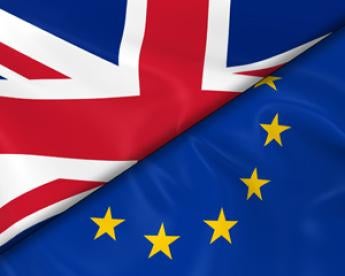On 24 December 2020, after intensive negotiations, the EU Commission reached a preliminary agreement with the UK on the terms of its future cooperation with the EU. The result of nine months of negotiations is a 1,246-page trade and cooperation agreement. The preliminary agreement consists of three parts, as outlined in detail in a press release as follows:
-
A free trade agreement – a new economic and social partnership with the UK
-
-
The agreement covers not just trade in goods and services, but also a broad range of other areas in the EU’s interest, such as investment, competition, state aid, tax transparency, air and road transport, energy and sustainability, fisheries, data protection, and social security coordination.
-
It provides for zero tariffs and zero quotas on all goods that comply with the appropriate rules of origin.
-
Both parties have committed to ensuring a robust level playing field by maintaining high levels of protection in areas such as environmental protection, the fight against climate change and carbon pricing, social and labour rights, tax transparency and state aid, with effective, domestic enforcement, a binding dispute settlement mechanism and the possibility for both parties to take remedial measures.
-
The EU and the UK agreed on a new framework for the joint management of fish stocks in EU and UK waters. The UK will be able to further develop British fishing activities, while the activities and livelihoods of European fishing communities will be safeguarded, and natural resources preserved.
-
On transport, the agreement provides for continued and sustainable air, road, rail and maritime connectivity, though market access falls below what the Single Market offers. It includes provisions to ensure that competition between EU and UK operators takes place on a level playing field so that passenger rights, workers’ rights and transport safety are not undermined.
-
On energy, the agreement provides a new model for trading and interconnectivity, with guarantees for open and fair competition, including on safety standards for offshore, and production of renewable energy.
-
On social security coordination, the agreement aims at ensuring a number of rights of EU citizens and UK nationals. This concerns EU citizens working in, travelling or moving to the UK and to UK nationals working in, travelling or moving to the EU after 1 January 2021.
-
Finally, the agreement enables the UK’s continued participation in a number of flagship EU programmes for the period from 2021 to 2027 (subject to a financial contribution by the UK to the EU budget), such as Horizon Europe.
-
-
A new partnership for our citizens’ security
-
-
The trade and cooperation agreement establishes a new framework for law enforcement and judicial cooperation in criminal and civil law matters. It recognises the need for strong cooperation between national police and judicial authorities, in particular for fighting and prosecuting cross-border crime and terrorism. It builds new operational capabilities, taking account of the fact that the UK, as a non-EU member outside of the Schengen area, will not have the same facilities as before. The security cooperation can be suspended in case of violations by the UK of its commitment for continued adherence to the European Convention of Human Rights and its domestic enforcement.
-
-
A horizontal agreement on governance –a framework that stands the test of time
-
-
To give maximum legal certainty to businesses, consumers and citizens, a dedicated chapter on governance provides clarity on how the agreement will be operated and controlled. It also establishes a Joint Partnership Council, which will make sure the agreement is properly applied and interpreted, and in which all arising issues will be discussed.
-
Binding enforcement and dispute settlement mechanisms will ensure that rights of businesses, consumers and individuals are respected. This means that businesses in the EU and the UK compete on a level playing field and will avoid either party using its regulatory autonomy to grant unfair subsidies or distort competition.
-
Both parties can engage in cross-sector retaliation in case of violations of the agreement. This cross-sector retaliation applies to all areas of the economic partnership.
-
In the view of the EU Commission, the entry into application of the trade and cooperation agreement is a matter of special urgency because the UK has extensive links with the EU and if there is no applicable framework regulating the relations between the EU and the UK after 31 December 2020, those relations will be significantly disrupted, to the detriment of individuals, businesses and other stakeholders. The late agreement, shortly before the end of the transition period on 31 December 2020, is not intended to jeopardise the right of the EU Parliament to exercise its democratic control under the EU Treaties. Due to the exceptional circumstances, the EU Commission has proposed to apply the agreement provisionally and until 28 February 2021. It has submitted to the EU Council decisions on the signing and provisional application on the conclusion. Once the EU Council has given its unanimous consent, the agreement can be formally signed. The EU Parliament must then give its approval. Finally, the EU Council must adopt the decision to conclude the agreement.
Further, there are various proposals for EU Council decisions on the signing, on behalf of the EU, and on provisional application of the trade and cooperation agreement between the EU and the EU Atomic Energy Community, of the one part, and the UK, of the other part, and of the agreement between the EU and the UK concerning security procedures for exchanging and protecting classified information, which the EU Commission submitted to the EU Council. One of the proposals for an EU Council decision (Annex 3) includes a Joint Declaration on Regulatory Cooperation in Financial Services:
Joint Declaration on Financial Services Regulatory Cooperation Between the European Union and the United Kingdom
- The Union and United Kingdom agree to establish structured regulatory cooperation on financial services, with the aim of establishing a durable and stable relationship between autonomous jurisdictions. Based on a shared commitment to preserve financial stability, market integrity, and the protection of investors and consumers, these arrangements will allow for: – bilateral exchanges of views and analysis relating to regulatory initiatives and other issues of interest; – transparency and appropriate dialogue in the process of adoption, suspension and withdrawal of equivalence decisions; and – enhanced cooperation and coordination including in international bodies as appropriate.
- Both Parties will, by March 2021, agree a Memorandum of Understanding establishing the framework for this cooperation. The Parties will discuss, inter alia, how to move forward on both sides with equivalence determinations between the Union and United Kingdom, without prejudice to the unilateral and autonomous decision-making process of each side.”
Consequently, the EU and the UK initially agreed to cooperate in a structured way in the area of financial services in order to establish a solid future relationship.




 i
i


